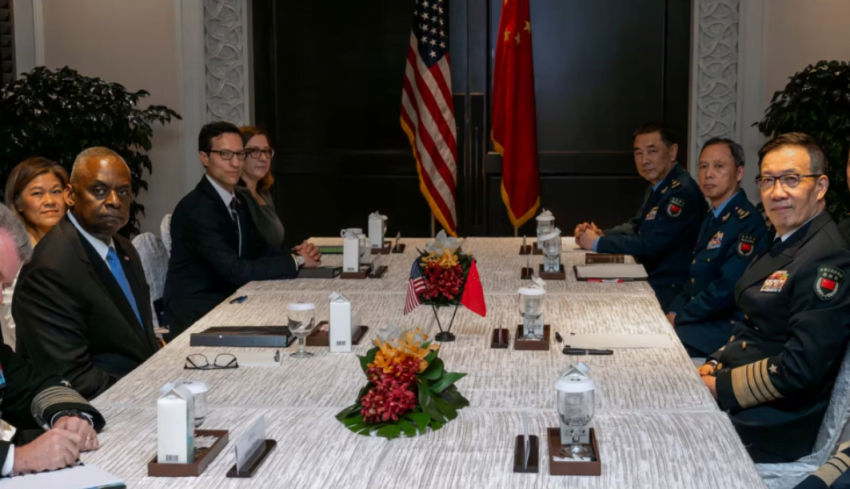U.S. Secretary of Defense Lloyd Austin stated during a high-level security meeting on Saturday that a war with China is neither imminent nor inevitable, despite the rapid escalation of tensions in the Asia-Pacific region. The American defense chief emphasized the importance of renewing dialogue between himself and his Chinese counterpart to avoid “miscalculations and misunderstandings.”
Austin made these remarks at the Shangri-La Dialogue, a defense forum in Singapore. Prior to the forum, Austin met for over an hour with Chinese Defense Minister Li Shangfu. This marked the first face-to-face meeting between senior defense officials since 2022, following China’s suspension of military communications with the United States after then-House Speaker Nancy Pelosi’s visit to Taiwan.
Both Beijing and Washington have maintained their positions on Taiwan. China claims the island as part of its territory and has not ruled out the use of force to bring Taiwan under its control. Additionally, China has made extensive claims over the South China Sea, leading to direct confrontations with other regional nations, particularly the Philippines.
While Austin did not disclose specific details of his conversation with the Chinese defense minister, he highlighted that the most important outcome was the resumption of dialogue between the two leaders.
Chinese Defense Minister Li Shangfu is scheduled to deliver a speech on Sunday at the annual security forum in Singapore. In recent years, Beijing has rapidly expanded its naval military capabilities as it reinforces its claims over nearly the entire South China Sea.
Additional Context:
The Asia-Pacific region has seen a significant increase in military activities, with both the United States and China conducting frequent military exercises. The U.S. has bolstered its alliances with regional partners such as Japan, South Korea, and Australia, aiming to counterbalance China’s growing influence. This strategic pivot, often referred to as the “Pivot to Asia,” underscores the U.S.’s commitment to maintaining stability and security in the region.
China’s Belt and Road Initiative (BRI) has further complicated the geopolitical landscape, as Beijing seeks to extend its economic and strategic reach across Asia and beyond. The BRI has led to significant infrastructure investments in various countries, but it has also raised concerns about debt dependency and sovereignty among recipient nations.
In response to China’s assertive stance in the South China Sea, the United States has conducted Freedom of Navigation Operations (FONOPs) to challenge what it views as excessive maritime claims. These operations aim to uphold international law and ensure unimpeded access to vital sea routes.
Despite the ongoing tensions, both nations have expressed a desire to manage their rivalry responsibly. Diplomatic efforts, such as the recent meeting between Austin and Li, are crucial in preventing an inadvertent escalation that could lead to conflict. The international community continues to watch closely, hoping for a peaceful resolution to the disputes that define the current U.S.-China relationship.







